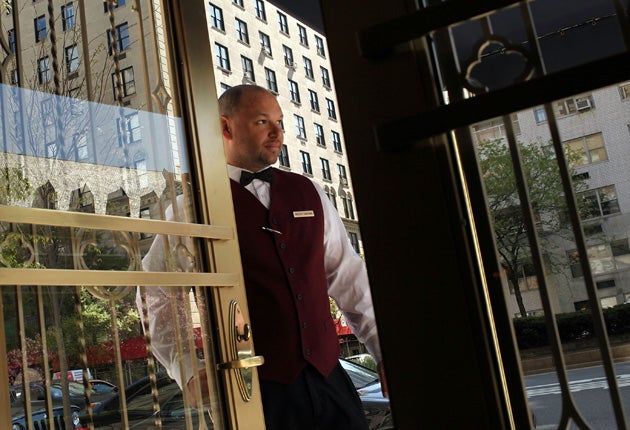Can New York survive without doormen?
30,000 men and women who keep city's apartment blocks running prepare to strike over pay and conditions

It is a normal Monday start for Raymond Herrera, one of six doormen at The Park Gramercy, a building with about 100 flats a few steps from the only private patch of green in all of Manhattan.
He smiles and nods as the residents file out to begin their week. From one elderly gentleman he takes an envelope saying: "I'll take care of it, sir."
But the rhythms of Manhattan's better neighbourhoods as well as those in Queens, Brooklyn and Staten Island, may be about to be severely disrupted as Herrera, 41, and about 30,000 other doormen in the city prepare for a possible strike over conditions and pay. The exception are doormen in buildings in the Bronx which have separate contracts which run until next spring.
Talks between their union, the Local 3BJ of the Service Employees International, and representatives of the city's building owners continued into the evening here yesterday with a deadline for strike action set for midnight tonight.
"It doesn't look good, from what I am hearing," says Herrera, his neatly pressed grey suit and broad peaked cap as crisp as the April air outside. He remembers the last time the doormen were in the same situation, in the late 1990s, and he was a strike captain for the neighbourhood. However, on that occasion the action was called off at the last moment. Indeed, Manhattan hasn't seen a full-blown doormans' strike for nearly 20 years.
The prospect of a walk-out is either chilling or entirely ho-hum, depending on your point of view. Most New Yorkers survive somehow without the pampering attentions of somebody downstairs, taking care of just about everything from accepting packages to making sure Pooksie doesn't miss her pet-pedicure appointment while you are at work.
But for those living in posher parts of town, the thought of their building losing its doorman, even for a day, is roughly akin to boarding an aircraft without any cabin crew. Indeed, if it goes on long enough, a strike could make First-Class living in New York positively fractious. Take out my own garbage? Perish the thought.
"A strike is not pleasant, nor should it be taken lightly," states a 45-page advisory that was being delivered to buildings across town yesterday by the Realty Advisory Board on Labor Relations. "During a period of work stoppage, pressures and problems develop which make building management very difficult."
Preparations for the worst scenario were in high gear up and down the golden avenues of the Upper East Side, on the freshly-greened cross-streets of the Upper West Side and here around Gramercy too. Many building owners will be forced to hire security staff to man the doors of their properties. Spoiled residents are as much concerned about the wrong people getting in as they are about the garbage finding its way out.
The average doorman makes about $40,000 (£26,000) a year, rising to about $70,000 (£45,700) with sundry benefits. Building owners are resisting calls for pay increases and are also trying to trim healthcare and pension entitlements, particularly for first-time workers. Officials last night said the two sides appeared still to be far apart.
Herrera, who has three children and lives in Queens, was a teenager when he first showed up for work at the Park Gramercy. He doesn't relish a strike and says he can understand why building owners are resisting the improvements his union are seeking. Since the last contract negotiations, property prices have slipped substantially while costs, especially for energy, have risen.
"But I don't have to tell you that we are seeing all the same things too. Doormen have to pay for oil at their homes. We need to make more money too. We have no choice, we have to make a stand," he said.
True, the residents would miss him and his colleagues, sometimes in ways that are hard to define. He hails the cabs and takes their envelopes but it is also about family and about familiarity. Herrera said: "I guess a lot of time, this is about therapy, they like to talk to us."
In this and many other buildings, getting on fine will mean mucking in, with residents taking on responsibilities they normally ignore such as making sure the the post is in the right place and the lobby plants are watered.
Mary Ann Rothman, of the Council of New York Cooperatives and Condominiums, sees a positive side. She considers that it would be an opportunity for neighbours, who seldom if ever communicate, to get to know one another. She said: "This is not the end of the world, though it may appear that way if the strike goes on."
Join our commenting forum
Join thought-provoking conversations, follow other Independent readers and see their replies
Comments
Bookmark popover
Removed from bookmarks